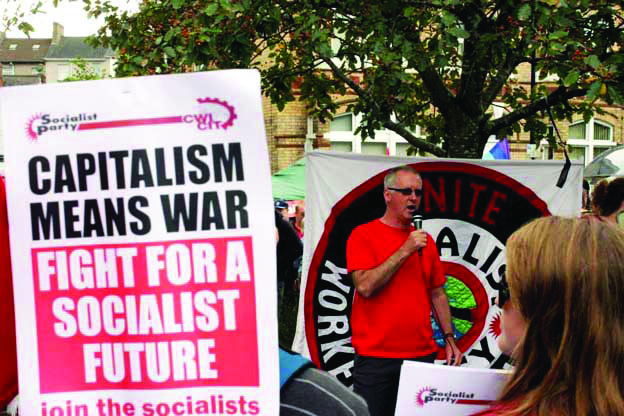Clare Doyle, Committee for a Workers’ International (CWI)
As Putin’s relentless assault on Ukraine has continued, Russian opposition to the war has not diminished.
Although a Russian opinion poll gives Putin 71% support, which is to be expected in the early phase of a ‘patriotic’ war, the general mood can change dramatically as the carnage and economic hardship drags on.
On Sunday 6 March protesters took to the streets and the squares of 53 cities. In the capital Moscow, 1,700 were arrested and in St Petersburg 750. According to the Russian independent monitoring group OVD-Info, over 7,500 protesters have been arrested since the start of the war.
Thousands came out to protest in cities as far away as Vladivostok and Irkutsk in Siberia, Ekaterinburg – Russia’s fourth largest city beyond the Urals in Asia – and even in the Russian Baltic enclave of Kaliningrad. A woman there protesting against the war said she had survived the Nazi siege of Leningrad and did not want to see any such atrocity repeated in her country.
Young people in St Petersburg have told friends abroad that, last year, they hesitated to risk beatings and prison sentences by coming onto the streets in support of the arrested bourgeois politician, Alexei Navalny.
Losing fear
Now, however, they have been coming out, without hesitation, to demand that Putin stops the war. “Bring back the army conscripts! Stop the killing of our brothers and sisters in Ukraine!” they call.
Organising a demonstration can entail a jail sentence of up to 20 years. But many people are demonstrating their anger in whatever way they can. Social media circulated a small video of four young people holding a banner: “Peace to the people; death to the government!” There is a call for short ‘warning strikes’ this week.
Hundreds of people also demonstrated on 6 March in Almaty, Kazakhstan – the scene of deadly clashes this January between protesters and state forces over the cost-of-living crisis and against the dictatorial regime – demanding an end to Putin’s war against the Ukrainian people. Socialists in the city, however, have expressed disappointment that most of the protesters were calling for imperialist Nato troops to intervene and protect Zelensky’s government.
In Russia, a split away from the misnamed Communist Party has been reported by some members who condemn the government for creating divisions between the workers of Russia and Ukraine. There has been some opposition expressed in Putin’s tame parliament with three Communist Party MPs breaking from their party in defiance of party leader Zyganov’s support for the war.
The most effective opposition that could actually stop the war in Ukraine would be workers refusing to supply the military forces, striking in the arms industries and calling on the rank and file of Putin’s army to refuse to fight.
This would mean a full-scale revolt being prepared and organised against the ruling oligarchic elite, paralysing Putin and the heads of the armed forces he has surrounded himself with.
Activists in Ukraine, interviewed on mobile phones when internet connections allowed, have spoken of their distress over not being able to make a difference in a rapidly deteriorating situation.
They have been involved in civilian defence forces, and were initially occasionally able to talk to Russian soldiers who have come against them. But without effective unions existing in the mines and other major workplaces, or any workers’ party that could speak out, no effective class appeal to the Russian workers in the invading army has been possible.
The tragedy of the situation in both Ukraine and Russia is the almost total absence of genuine, democratic workers’ organisations – trade unions or parties with socialist ideas and principles in their DNA.
The history of both countries has made the building of such forces extremely difficult. After the collapse of Stalinism and the USSR itself, crash privatisations devastated both economies and left the ‘commanding heights’ in the hands of robber barons, kleptocrats and oligarchs.
With this war, the economies of both Russia and Ukraine have entered major crises.
A return to the fundamental principles of working-class struggle and the re-establishment of state ownership and workers’ control are now the only way forward for both.
Kharkiv eyewitness: ‘We’re living in terror’
Clare Doyle
On the evening of 2 March, I spoke to Lyudmila, a 45 year-old Ukrainian teacher. She was sheltering in a basement in Kharkiv – Ukraine’s second city – under siege by Russian forces. Lyudmila was pleading for help, knowing we were socialists with international connections.
She described the nightmare conditions she and her elderly parents were enduring. “There are 30 of us in a basement. There are no toilet facilities and a few rags to clean the place with.” Everyone was terrified and did not know if they would survive another day.
The next morning I texted Lyudmila and received a message. They had survived the night, but: “Shells are constantly raining down on us. We are all still sitting in the basement, it’s really terrifying!”
“Everyone is trying to get away. But you first have to get to the station, and there’s constant shooting going on. We heard of one African student being killed.
“There’s nothing left in the shops. Volunteers are bringing us bread. The pharmacies have run out of medicines for people with heart problems. It’s frightening even to put your nose out into the street.
“There needs to be a ceasefire and an end to war. There must surely still be levers of influence that can be pulled against this madness. Stop this, I implore you! Peaceful people are dying for nothing! Huge gratitude to you for thinking of us!”.
News finally came that Lyudmila was on her way to Lviv – a staging post for hundreds of thousands of refugees, forced out of their homes, possibly forever.








